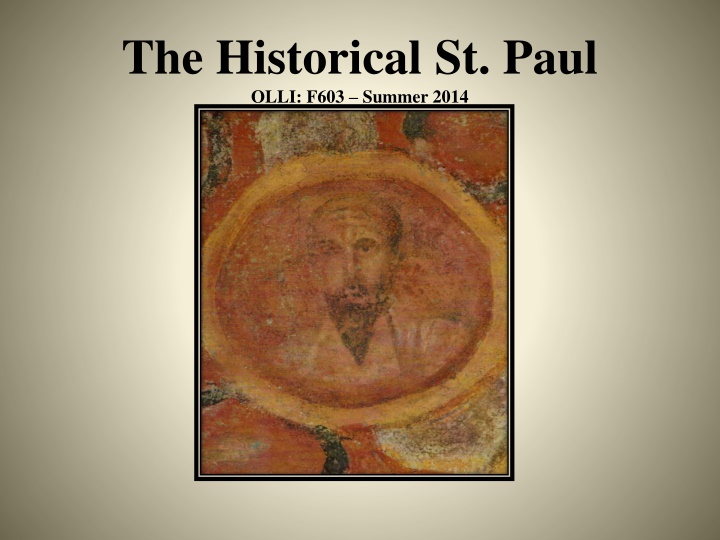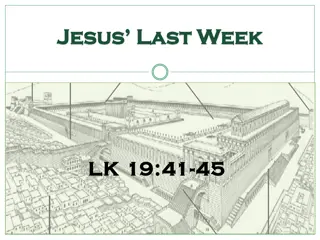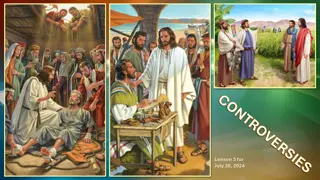The Life and Teachings of Jesus: A Historical Perspective
Jesus, born around 6-4 BCE in Nazareth, taught about the Kingdom of God and stirred controversy, leading to his crucifixion by Pontius Pilate. His disciples believed in his resurrection and awaited his return. Christianity emerged not solely from his teachings but from the resurrection experience, shaping early Christology.
Download Presentation

Please find below an Image/Link to download the presentation.
The content on the website is provided AS IS for your information and personal use only. It may not be sold, licensed, or shared on other websites without obtaining consent from the author.If you encounter any issues during the download, it is possible that the publisher has removed the file from their server.
You are allowed to download the files provided on this website for personal or commercial use, subject to the condition that they are used lawfully. All files are the property of their respective owners.
The content on the website is provided AS IS for your information and personal use only. It may not be sold, licensed, or shared on other websites without obtaining consent from the author.
E N D
Presentation Transcript
The Historical St. Paul OLLI: F603 Summer 2014
The Life Of Jesus Jesus was born c. 6-4 BCE, near the time of the death of Herod the Great. He spent his childhood and early adult years in Nazareth, a Galilean village. He was baptized by John the Baptist. He called disciples. He taught in towns, villages and the countryside of Galilee (apparently not in cities). He was known to be a healer and exorcist. He preached the coming Kingdom of God. About the year 30 he went to Jerusalem for Passover.
The Life Of Jesus He created a disturbance in the Temple area. He had a final meal with the disciples. He was arrested and interrogated by Jewish authorities, specifically the high priest. He was executed on the orders of the Roman prefect, Pontius Pilate, for claiming to be the King of the Jews. His disciples abandoned him but were not arrested or executed. His disciples saw him (in some sense) after his death. As a consequence, they believed that he would return to found the Kingdom of God. They formed a community to await his return and sought converts to their faith in Jesus as God's Messiah. E. P. Sanders, The Historical Figure of Jesus Paula Fredriksen, From Jesus to Christ
The Teachings Of Jesus Jesus taught about the imminent arrival of the Kingdom of God. The Kingdom s arrival would be heralded by a cosmic figure called The Son of Man. To prepare for God s judgment, all Jews needed to follow the Torah and repent of their sins. Jesus offered an immediate and direct route to God s love and mercy. God s judgment would bring about a total reversal of the social order. Those in power (the forces of evil) would be removed, and the oppressed would be exalted. The first shall be last and the last first. Mark 10:30 For Jesus, these were not long term ethical commandments. The end was very close and this was how all Jews were to prepare.
When Does Christianity Begin? Christianity is born, not as a direct result of Jesus teachings, but as a result of what God is claimed to have done through his death and resurrection. 1) The Jesus movement during his life was disorganized. 2) Jesus died without the presence of his disciples. 3) Jesus teachings are paradoxical, not systematic. 4) Christianity begins with the resurrection experience. Luke Timothy Johnson Early Christianity
Early Exaltation Of Jesus With regard to the development of all the early Church s Christology more happened in the first 20 years than in the entire later, centuries long development of dogma. - Martin Hengel, New Testament Scholar The earliest Christians understood Jesus to have become the Son of God at his resurrection. They held that God had exalted Jesus to divine status (Adoptionist Christology). By the time of the Gospel of Mark, Jesus became the Son of God at his baptism by John. Still later, in the Gospels of Matthew and Luke, Jesus became the Son of God at his birth. Finally, with the Gospel of John, we have Jesus presented as the Son of God before creation. Bart Ehrman, How Jesus Became God
Sources for the Historical Paul We have two sources for the Historical Paul: the 13 letters he is said to have written and the Book of Acts; the second part of the Gospel of Luke. However, available sources about Paul s life are riddled with historical inaccuracies. Scholars believe that only 7 of the 13 letters in the New Testament were actually by Paul, and that the accounts of his life in the Acts of the Apostles are note completely reliable. Dale Martin, Yale Religious Studies
How We Remember Remembering is not like reading a book but rather like writing a book. If there are blanks, we fill them in. Because human memory leaks and dissociates, all of us are to one degree or another, fabulists, even when we try not to be. As modern research abundantly documents, memory often leads us astray. Among its many sins are the following, all of which matter for sober, honest study of Jesus. - Dale Allison, Constructing Jesus
The Problems With Memory 1. Long-term memory is reconstructive as well as reproductive and so involves imagination. Post event information often becomes incorporated into memory, supplementing and altering a person s recollection. We are apt to project present circumstances and biases onto our past experiences. Memories are not evergreen. They become less and less distinct as the past recedes. Memories are subject to sequential displacement. We often move remembered events forward and backward in time. Memories are a function of self-interest. We revise them in order to help maintain a meaningful sense of self-identity. Groups do not rehearse competing memories that fail to shore up what they hold dear. No infallible inner voice or sense can consistently adjudicate the accuracy of our recall. 2. 3. 4. 5. 6. 7. 8.
The Letters of Paul Paul is credited with writing 13 letters. They account for nearly half of the New Testament s 27 books. Undisputed: Romans, 1 Corinthians, 2 Corinthians, Galatians, Philippians, 1 Thessalonians, Philiemon Deutero-Pauline Epistles: Ephesians, Colossians, 2 Thessalonians Pastoral Epistles: 1 Timothy, 2 Timothy, Titus
Why Did Paul Write Letters? Pt. 1 We must remember that Paul s converts were Gentiles (pagans) who had, at best, a passing familiarity with Judaism and Jesus. Because Paul could only spend a short time in each town, he would move on before newly converted church members had a complete grasp of this new theology. Inevitably, problems would arise from doctrinal misunderstandings or ethical questions. The churches would write Paul with questions and his letters were his attempt to address those specific issues.
Why Did Paul Write Letters? Pt. 2 Another reason for Paul s letter writing was perhaps the most frustrating for him: the arrival of other Christian missionaries whose preaching contradicted Paul s. For example, a group of such missionaries apparently informed Paul s Galatian church that in addition to believing in the resurrection of Jesus, male converts had to be circumcised in order to be right with God.
Are Pauls Letters Forgeries? Three of Paul s 13 letters, 1 and 2 Timothy and Titus are considered by most historians to be pseudonymous, which means someone used Paul s name to lend credibility to their work. The letters feature writing styles, vocabulary and theological points of view that do not match up with Paul s genuine letters. Outside the New Testament, we have many other forgeries in the name of Paul, such as 3 Corinthians and Laodiceans.
Who Was Luke? In the first book, O Theophilus, I have dealt with all that Jesus began to do and teach, until the day when he was taken up, after he had given commands through the Holy Spirit to the apostles whom he had chosen. He presented himself alive to them after his suffering by many proofs, appearing to them during forty days and speaking about the kingdom of God. The Holy Bible, English Standard Version
The Acts Of The Apostles Our other source for St. Paul. Written by the anonymous other of Luke. Acts picks up the story of Jesus after his ascension. It deals with the spread of Christianity throughout the Mediterranean world, and the evolution of the religion from all Jewish to the inclusion of Gentiles. Paul is the hero of Acts.
Modern vs. Ancient History The ancients had no way to record a given moment at the point it occurred. Ancient historians favored oral over written sources. They were deemed more trustworthy. A fact in ancient times did not always mean the literal truth. Instead, it was often used to represent a more general truth. There was no expectation to record speeches verbatim. Rather, the author needed to convey what would probably have been said in a given situation. Ancient historians had limited ability to check the reliability of there sources.
Historical Problems With Acts As E. P. Sanders notes, the biggest historical concern with Acts is that its author and Paul are in fundamental disagreement as to Paul s mission. Acts see s Paul first as the apostle to the Jews of the Greek- speaking Diaspora. Unfortunately, they rejected him. Paul, however, sees himself exclusively as the apostle to the Gentiles. Paul tells us that Peter was the Apostle to the circumcised. Acts describes Paul differently from how he describes himself, both factually and theologically. Acts seems to differ with Paul's letters on important issues, such as the Law, Paul's own apostleship, and his relation to the Jerusalem Church. Scholars generally prefer Paul's account over that in Acts. Wikipedia, 6/13/13
Did Other Gospel Writers Know Paul? The author of Luke clearly knows of Paul, but never mentions his letters. The other gospels are silent on the topic. Some like Joel Marcus have argued for Mark s familiarity with Paul. Michael Goulder argued that Luke knew at least 1 Corinthians. Others believe Luke knew of Galatians, as well. 2/16/13 email from Mark Goodacre, Duke University
Pauls Biography: His Letters He calls himself a Hebrew and a zealous Pharisee. He is highly educated. He persecuted the Jesus movement. Around 32-35 CE, Paul has a vision of the risen Jesus. He receives his gospel directly from a revelation of Jesus Christ, and is called to serve the non-Jewish world. He first goes to Arabia, then Damascus. Three years after his apostolic call, he makes the first of three trips to Jerusalem. He meets Peter and James, but none of the other apostles. The second trip is 14 years after his call when he appears before the Jerusalem leadership to explain his gospel and mission to the Gentiles. He writes to the Church in Rome about a third trip to Jerusalem and his hope to visit Rome afterwards.
Pauls Biography: His Letters Paul claimed many revelations from Jesus including direct voice communications and an ascent to the highest level of heaven. He had a physical disability sent by Satan. He claimed to have worked signs and mighty works that confirmed his apostleship. He was unmarried during his missionary days. He experienced numerous occasions of persecution including beatings, stoning's and a shipwreck. He worked as a manual laborer to support himself.
Pauls Biography: The Book of Acts Paul s Hebrew name was Saul. He was born in Tarsus a city in modern day Turkey. He came from a family of Pharisees and had a sister and nephew that lived in Jerusalem. He was born a Roman citizen. He had some role in the death of Stephen, the first member of the Jesus group to be executed. He was sent to Damascus to further persecute the Jesus movement when he has his vision of the risen Jesus. He worked as a tentmaker or leather worker.
Modern Scholars & Paul The Nangeroni Seminar on Paul as a Second-Temple Jew took place in June, 2014 in Rome. This encouraging and demanding event brought together about 35 scholars from various countries who are specialists on second-temple Judaism and/or the Apostle Paul. The broad conclusion to which all assented is that Paul was and remained in his ministry as apostle to gentiles a Jew. He did not renounce his identity as a member of the Jewish people. He did not demonize his ancestral religion. He did not reject the Torah ( Law ) as false. He did not regard his Jewish past as one of frustration, failure, inability to observe Torah, or as something to escape. Instead, Paul claims to have practiced Torah successfully and happily. He does not refer to himself as converted from Jewishness to being a Christian. Instead, he claims to have had a powerful experience that he describes as a revelation of Jesus as God s Son, and a special calling to proclaim God s welcome to non-Jewish peoples ( Gentiles ) without their having to convert to Judaism. - Larry Hurtago Blog, 7/2/14
Paul Persecutes Christians For you have heard of my former life in Judaism, how I persecuted the church of God violently and tried to destroy it. And I was advancing in Judaism beyond many of my own age among my people, so extremely zealous was I for the traditions of my fathers. But when he who had set me apart before I was born, and who called me by his grace, was pleased to reveal his Son to me, in order that I might preach him among the Gentiles, I did not immediately consult with anyone; nor did I go up to Jerusalem to those who were apostles before me. - Gal. 1:13-17
Pauls Conversion: His Letters 1 For what I received I passed on to you as of first importance: that Christ died for our sins according to the Scriptures, that he was buried, that he was raised on the third day according to the Scriptures, and that he appeared to Cephas, and then to the Twelve. After that, he appeared to more than five hundred of the brothers and sisters at the same time, most of whom are still living, though some have fallen asleep. Then he appeared to James, then to all the apostles, and last of all he appeared to me also, as to one abnormally born. 1 Corinthians 15:3-8
Pauls Conversion: His Letters 2 I want you to know, brothers and sisters, that the gospel I preached is not of human origin. I did not receive it from any man, nor was I taught it; rather, I received it by revelation from Jesus Christ. For you have heard of my previous way of life in Judaism, how intensely I persecuted the church of God and tried to destroy it. I was advancing in Judaism beyond many of my own age among my people and was extremely zealous for the traditions of my fathers. But when God, who set me apart from my mother s womb and called me by his grace, was pleased to reveal his Son in me so that I might preach him among the Gentiles, my immediate response was not to consult any human being. - Galatians 1:11-16
Pauls Conversion: Acts of the Apostles As he neared Damascus on his journey, suddenly a light from heaven flashed around him. He fell to the ground and heard a voice say to him, Saul, Saul, why do you persecute me? Who are you, Lord? Saul asked. I am Jesus, whom you are persecuting, he replied. Now get up and go into the city, and you will be told what you must do. The men traveling with Saul stood there speechless; they heard the sound but did not see anyone. Saul got up from the ground, but when he opened his eyes he could see nothing. So they led him by the hand into Damascus. For three days he was blind, and did not eat or drink anything. Acts 9:3-9
Problems With Acts There are two major problems with Paul s conversion story as it is related in Acts. 1) Luke claims Paul s revelation occurred as he travelled from Jerusalem to Damascus with high priestly authority to bring back dissident Jewish Christians for punishment. That is impossible since Jerusalem high priests lacked authority outside their immediate jurisdictions. In addition, in his letter to the Galatians (1:11-17), Paul states that after his encounter with Jesus, he went away at once into Arabia, and afterwards I returned to Damascus. Paul presumes his audience knows the story started in Damascus where he was living. Paul never refers to high priestly authority. Borg, Crossan The First Paul
Problems With Acts 2) On three different occasions, Luke/Acts emphasizes that on the road to Damascus, Paul saw a light and heard the voice of Christ. However, he never sees the face of Jesus. In his letter to the Corinthians (9:1), however, Paul is emphatic that he saw Christ. Am I not an apostle? Have I not seen Jesus our Lord? For Luke, Paul is an apostle sent by God, but only indirectly. The language of Acts holds the Twelve in higher regard because they not only saw Jesus, but because they travelled with Jesus. Borg, Crossan The First Paul
Why Convert Gentiles? Paul believed he had received a calling in the same sense that Hebrew prophets received callings as a messenger of the Lord. Paul s Gospel for the Foreskin participated in a specific apocalyptic hope of his day (found in the Book of Isaiah, among others) that the eschatological pilgrimage of uncircumcised Gentiles, who turn from idols to worship the God of Israel, would portend the Final Judgment. J. Albert Harrill, Paul The Apostle
How Did Paul Win Converts? Acts offers two descriptions: 1) public debating with philosophers (Acts 17:17-18) and attempting to convince Jews by speaking at synagogues (Acts 9:20). However, Paul never mentions this in any of his authentic letters. Instead, Paul sees himself first and foremost as the apostle to the Gentiles and that his convert are former pagans. (1 Thess. 1:9)
How Did Paul Start A Church? It appears that Paul would move into a town and set up a small business. The Book of Acts says Paul worked in leather goods. As customers would come in, Paul would ask about their religious beliefs, then seek to convert them until he had enough members for a weekly gathering. When the church was of a sufficient size, Paul would move to a new town and begin again.
What Is Apocalypticism? A worldview held by many ancient Jews and Christians that maintained that the present age is controlled by forces of evil (sin and death), but that these will be destroyed at the end of time, when God intervenes in history to bring in his Kingdom, an event thought to be imminent. John the Baptist, Jesus, the Apostles and Paul were apocalyptic.
Pauls Apocalyptic Message FJ2C Vol. 2 38:25-40:00
The End Times Begin Paul was an apocalyptic Jew who believed that the Kingdom of God was already breaking in to reshape the cosmos. For Paul, though, it was Jesus resurrection that signaled that the end times had begun. Christ was the first fruits of the end time. Now, it was simply a matter of waiting for those in Christ to be taken up to meet their Lord.
The Second Coming We who are alive, who are left until the appearance of the Lord, will not proceed those who have fallen asleep. For the Lord himself will come down from heaven with a command, with the voice of an archangel, and with a trumpet of God; and the dead in Christ will rise first, then we who are alive will be snatched up with them in the clouds to greet the Lord in the air. - Thess. 4.15-17
What Is The Parousia? Now when He had spoken these things, while they watched, He was taken up, and a cloud received Him out of their sight. And while they looked steadfastly toward heaven as He went up, behold, two men stood by them in white apparel, who also said, "Men of Galilee, why do you stand gazing up into heaven? This same Jesus, who was taken up from you into heaven, will so come in like manner as you saw Him go into heaven. Acts 1:9-11 The coming of Christ will be instantaneous and worldwide. "For as the lightning comes from the east and flashes to the west, so also will the coming of the Son of Man be." Matthew 24:27 The coming of Christ will be visible to all. "Then the sign of the Son of Man will appear in heaven, and then all the tribes of the earth will mourn, and they will see the Son of Man coming on the clouds of heaven with power and great glory." Matthew 24:30 The coming of Christ will be audible. "And He will send His angels with a great sound of a trumpet, and they will gather together His elect from the four winds, from one end of heaven to the other." Matthew 24:31
The Letters: 1 Thessalonians (ca: 51) Thessalonica is located in Greece. The recipients were all Gentiles. The Thessalonian church was grieving the loss of fellow believers and were being harassed by pagan family members and neighbors. Paul tells us he evangelized while working a craft to support himself, rather than through powerful speeches. Paul asks his converts to live quietly, depending on no one.
The Letters: Galatians (ca: 54) Galatia is located in modern day Turkey. Paul was in conflict with Jerusalem based missionaries and certain people from James. Paul is accused of being a religious fraud and a demonic messenger. Paul confronts Peter. The situation appears dire as Paul states, I am astonished that you are so quickly deserting the one who called you
The Letters: 1 Corinthians (ca: 53/54) Corinth is located in Greece. An earlier, unknown Pauline letter is referenced. The all gentile church seems to be near collapse. Conflict has erupted over matters of hierarchy. Paul s main goal was to urge his congregation to reconcile their internal discord.
The Letters: 2 Corinthians (ca: 54-56) Believed to contain fragments from as many as five different Pauline letters. Paul is offended by a Corinthian church member. He is accused of being crafty and deceitful. Paul once again attacks rival missionaries who apparently come from Jerusalem and mock his weakness of body and speech. Paul calls them servants of Satan and super apostles. These are different missionaries than the ones mentioned in Galatians.
The Letters: Philippians (ca: 56) Philippi is located in northern Greece. Paul apparently wrote the letter while imprisoned for missionary activities. Paul is thanking his church for sending him financial assistance. Once again, Paul warns his congregation against the preaching of rival missionaries. Beware of the dogs beware of those who mutilate the flesh. May be composed of three letters.
The Letters: Philemon (ca: 56) Philemon was an associate of Paul s. Letter written from prison. Paul writes that he is sending the slave Onesimus back to his master, Philemon. Uncertain whether Paul wants the slave freed. The letter points to the evidence of slavery in early Christianity.
The Letters: Romans (ca: 57) Written to a church Paul did not found. It is an introduction (and a defense) in advance of Paul s visit to Rome on his way to Spain. Paul believed he had accomplished his mission in the eastern Mediterranean, he was now turning towards the west. Revisits the theme of the relationship between Jews and Gentiles. It represents the clearest view of Paul s beliefs.
Pauls Greetings In Romans I commend to you our sister Phoebe, a servant of the church at Cenchreae, that you may welcome her in the Lord in a way worthy of the saints, and help her in whatever she may need from you, for she has been a patron of many and of myself as well. Greet Prisca and Aquila, my fellow workers in Christ Jesus, who risked their necks for my life, to whom not only I give thanks but all the churches of the Gentiles give thanks as well. Greet also the church in their house. Greet my beloved Epaenetus, who was the first convert to Christ in Asia. Greet Mary, who has worked hard for you. Greet Andronicus and Junia, my kinsmen and my fellow prisoners. They are well known to the apostles, and they were in Christ before me Greet Rufus, chosen in the Lord; also his mother, who has been a mother to me as well. Greet Asyncritus, Phlegon, Hermes, Patrobas, Hermas, and the brothers who are with them. Greet Philologus, Julia, Nereus and his sister, and Olympas, and all the saints who are with them Timothy, my fellow worker, greets you; so do Lucius and Jason and Sosipater, my kinsmen. Tertius, who wrote this letter, greet you in the Lord. Gaius, who is host to me and to the whole church, greets you. Erastus, the city treasurer, and our brother Quartus, greet you. Romans 16: 1-23
Pre-Literary Traditions We have no Christian writings before Paul s first letter around the year 50. Many biblical scholars believe that remnants of older Christian oral traditions can be found in Paul s genuine letters.























